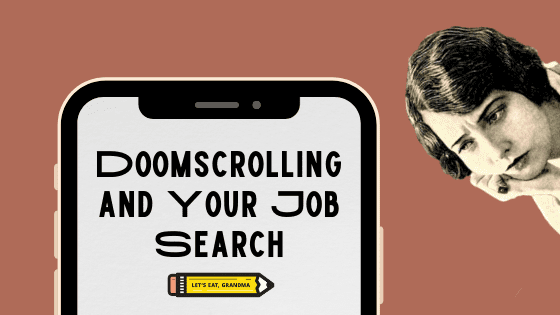Doomscrolling is Cratering Your Job Search — Here’s How to Break Free

Doomscrolling — one of the new words of 2020 — is a bad habit that’s wrecking your mental health and your job search. Here’s how to get back on track.
By: Grace Mitchell | Contributor for Let’s Eat, Grandma
One of the numerous unexpected impacts of 2020 is that many of us have added a new word to our lexicon: “doomscrolling.” This term, which was used on Twitter just two times in 2018, is now being named one of the words of 2020.
But what, exactly, is doomscrolling? Dictionary.com defines it as “the practice of obsessively checking online news for updates, especially on social media feeds, with the expectation that the news will be bad, such that the feeling of dread from this negative expectation fuels a compulsion to continue looking for updates in a self-perpetuating cycle.”
Want more job search tips? Sign up for our newsletter!
The very design of social media sites reinforces this destructive habit. Because a social media website’s revenue relies on advertisements (which relies on more time on the site and more engagement from the user), most of these sites allow the user to scroll infinitely. In an article for the Wall Street Journal, Coye Cheshire, professor of sociology at UC Berkley’s School of Information says: “[the infinite scroll] leaves people feeling psychologically like they can never catch up on all the information. They never reach the satisfaction of being able to say, ‘Ah, now I understand the problem.’“
Doomscrolling Is Bad For You
Many have turned to doomscrolling as a means of coping with the stress of a difficult year full of unknowns. But what started as a coping mechanism has become a problem in its own right.
Doomscrolling is well-documented to be bad for your mental health, with psychologists linking the behavior to conditions like depression, anxiety, and even obsessive-compulsive disorder. Additionally, this habit is negatively impacting your job search.
At the best of times, job searching is a time-consuming, discouraging task. When we’re in a state of heightened anxiety—an inevitable result of the negativity cycle of doomscrolling—the task grows even more arduous. That’s why it’s crucial to prioritize mental health and genuine self-care during the job search. And by self-care, we mean proper rest, nutrition, movement, and destressing practices, not just a binge-watching session of The Office. (Unless, of course, you’re already prioritizing the aforementioned practices and a bit of binge-watching is what you need right now. In that case, you do you, boo.)
Job Searching or Doomscrolling?
While doomscrolling may begin on sites like Facebook and Twitter, perhaps you’ve expanded this practice to seeking out bad news about the economy and job market. We don’t have to look far to find reports on the unemployment rate and failing industries, as well as rants bemoaning our society’s “broken” hiring practices. Some job seekers may believe this type of doomscrolling is essential for the job search; after all, it’s good to be informed. However, consuming this information—especially for hours at a time—isn’t productive, and it causes you to lose hope in your prospects.
The reality is that there are still plenty of companies still hiring if you search strategically, and our career coach partners are still posting regularly about their clients getting hired. Yes, navigating the job market is difficult right now. But just like negative information is there if we seek it out, so too can we inundate ourselves with positive information. (If you’re looking for somewhere to start, see the comments on this post!)

Are you really boosting your job search on LinkedIn, or are you just scrolling through bad news and hot takes about the job market? (Photo by Tim Gouw on Unsplash.)
Another consideration is that just because you’re on LinkedIn doesn’t mean you’re being productive. Simply put, the time you’re spending reading about bad recruiters or presumed flaws in Applicant Tracking Systems (ATS) is time you’re not spending searching for jobs (and if you’re the one posting these rants, here’s Grandma’s reminder that the internet is forever and that potential recruiters can see your posts). You owe it to yourself to spend your job searching time actually job searching!
Stopping the Scroll
Now that you’re on board to crush the habit, here are a few recommendations:
#1) Stop it at its source. As we mentioned at the outset, the very design of social media sites reinforces our doomscrolling habit. You know your needs better than anyone; if taking a pause from social media is what your job search needs, let this be an invitation to take that step. Alternatively, setting clear boundaries around your media usage can be a great way to keep doomscrolling at bay.
A quick note: LinkedIn is a social media site, but it fits in a bit of a different category for job seekers. Remember to spend time connecting with people and making posts and comments relevant to your industry, rather than aimlessly or angrily scrolling through your feed.
#2) Build and stick to a routine. Since doomscrolling is a means of coping with current events which are outside of our control, one antidote is to focus on what we can control. Taking care of your body and mind also helps you avoid the negative headspace that makes doomscrolling so tempting.
#3) Practice presence. In an article with The Guardian, writer Julia Bell states that “being totally present with ourselves, and with each other, is an active form of hope.” Increased attention to your thoughts and emotions, as well as to those around you, discourages the negative habit of doomscrolling. And when we find ourselves in the midst of it, acknowledging what we’re doing also makes it easier to stop.
#4) Get help if you need it. If your doomscrolling has gotten completely out of control, it may benefit you to talk about the underlying anxieties with a mental health professional or a trusted friend. This has been a difficult year, and it’s okay if you need to process it.

If doomscrolling is a serious problem for you, reach out to a friend or even a professional for help. You WILL get through this! (Photo by Babyman Works on Unsplash)
Job Searching, Hold the Doom
We’ve posted before about how to deal with the stress that comes from job hunting, but many of these tips are worth revisiting here.
#1) Look at the big picture. As you think about your job search, remind yourself what you’re looking for and why you’re looking. What are your long-term career goals? What about your career goals right now? Whether you want to bounce back after an unexpected layoff, provide for your family through a larger salary, or switch to a career you really want to work in, keeping your “why” in mind—and relating it to your long-term vision—will help keep you in the right space to spot the jobs you want to apply for (and not waste time on the ones you don’t).
#2) Make a plan. Mark the time you’ll be spending on the job hunt on your calendar and stick to it! You can divide your search into more manageable tasks (like one hour of looking at jobs one day and two hours of tailoring your resume to those jobs the next), but consistency is key here. Your job search should be part of your weekly routine for as long as your search lasts. And as a bonus, building a solid routine that incorporates your job search will help you avoid doomscrolling.
#3) Track as you go. Make notes of the positions you apply for as you continue your search. You can even use a pen and paper if your newly-realized doomscrolling habit is making you want to spend less time online.
2021 may present many of the same challenges 2020 did, but we can still let this be the year we refocus our job searches and get back on track. After all, doomscrolling is so last year.
Want more job search tips sent straight to your inbox? Sign up for our newsletter here:
Better Resume.
Satisfying Career.
Happier You.

